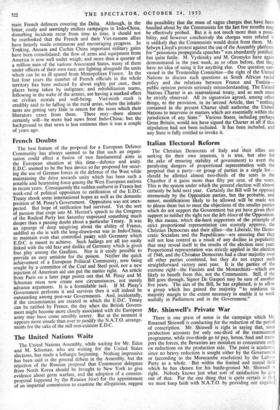French Doubts
The best feature of the proposal for a European Defence Community has always seemed to be that Such an organi- sation could effect a fusion of two fundamental aims in the European situation at this ,time—defence and unity. E.D.C. seemed to be the best device so far proposed for secur- ing the use of German forces in the defence of the West while maintaining the drive towards unity which has been such a notable and heartening force mong the West European nations in recent years. Consequently 'the sudden outburst in France last week-end of political opposition to ratification of the E.D.C. Treaty shook some international hopes as well as the domestic position of M. Pinay's Government. Opposition was not unex- pected. But hope of ratification had survived. Yet the sort of passion that crept into M. Herriot's speech to the Congress of the Radical Party last Saturday expressed something much deeper than a passing doubt about a particular Treaty. It was an upsurge of deep misgiving about the ability of Ftance, saddled as she is with the long-drawn-out war in Indo-China, to maintain even that controlled parity with Germany which E.D.C. is meant to achieve. Such feelings are all too easily linked with the old fear and dislike of Germany which is given free play among the Gaullists. Nor is it easily possible to provide an easy antidote for the poison. Neither the quick achievement of a European Political Community, now being sought by a committee of the Coal and Steel pool, nor a new injection of American aid can put the matter right. An article from Paris on a later page points out that M. Pinay and M. Schuman must now create new circumstances, not merely advance arguments. It is a formidable task. If M. Pinay's Government performs it and survives then it will indeed be outstanding among post-war Governments. And, incidentally, if the circumstances are created in which the E.D.C. Treaty can be ratified by France, the day when the British Govern- ment might become more closely associated with the European army may have come sensibly nearer. But at the moment it appears more unsafe than ever to modify the N.A.T.O. arrange= ments for the sake of the still non:existent E.D.C.


































 Previous page
Previous page